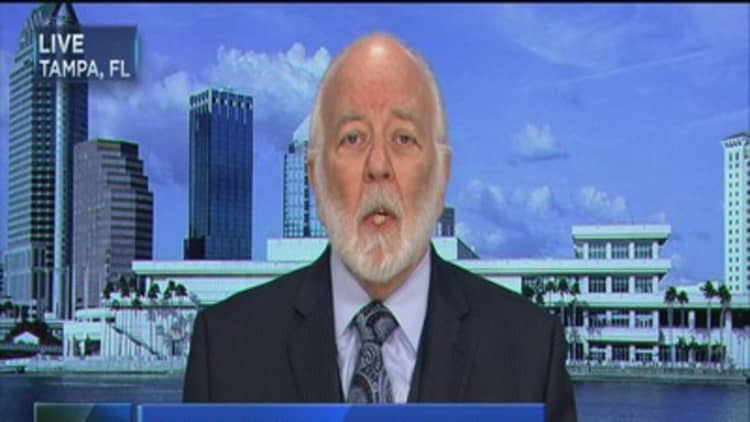
As investors continue to debate the federal tightening of monetary policy, the debate has become greater than the rates.
It is no longer a matter of whether the Fed should increase interest rates; the focus has now shifted to the pace at which the Fed should raise rates.
The Fed had "better raise rates or they're not doing what they should," said Dick Bove, equity research analyst to CNBC's "Power Lunch."
Amid the heightened debate surrounding rising demand, the Fed will be pressured to finally raise rates, Bove said Tuesday.
Wells Fargo CEO John Stumpf also told CNBC's "Squawk on the Street" on Tuesday that he believes that interest rates will increase.
Still, Stumpf thinks the rates should remain "lower for longer" on the long-term side to create a greater global impact. In this scenario, the rates shouldn't go up rapidly in 2016 but should rise at a modest pace to match economic demands.
But Bove said "banks don't benefit if the rates don't go up," adding he believes the financial industry has been nationalized.
After the 2008 financial collapse, financial regulations tightened and banks had to comply with reserve requirements, stress-test regulations and other regulatory policies that allowed the federal government to closely supervise banking in the U.S.
Bove argued that one of the Federal Reserve's most recent regulation proposals, particularly the Total Loss Absorbing Capacity (TLAC) and the Liquidity Coverage Ratio (LCR), force banks to "borrow long at high cost, and lend short at low returns, causing losses."
In terms of the TLAC, Stumpf considers that Wells Fargo, America's largest bank by market cap, doesn't need to acquire loss-absorbing capital, but "it's what we've been asked to do."
"I think that we have enough capital the way it is, but if loss-absorbing capital is required through debt, we're going to raise it," he said to CNBC's "Squawk on the Street."
In that vein, Bove pointed to the velocity of money declining "precipitously," due to the Fed's being provided with money at virtually no return, instead of providing it to the private sector.
"You don't put 22 percent of any nation's money supply, at the central bank, and then give it to the government and expect the economy to rise," he said.
Investors that will buy bank stocks should look forward to rate hikes from the Fed, Bove said.
"Without a rate increase, it is going to be extraordinarily difficult for banks to show increases in their earnings," he said.
"If that isn't a screwed-up financial system, I don't know what is," he told "Power Lunch."



